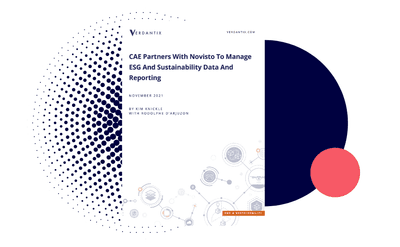
In the post-pandemic era, ESG is high on the corporate agenda, but many companies still rely on outdated, manual technologies — such as spreadsheets and email — to collect, manage, and report their ESG data.
These outdated systems and tools pose both security and inaccuracy risks, but they also make the reporting process far more time-consuming than it needs to be.
This article will explore the key challenges associated with ESG reporting, and how sophisticated ESG data management platforms can transform the reporting process from complicated and time-consuming to efficient and insightful.
Top challenges in ESG reporting
Despite its popularity, ESG reporting is not a simple process. Companies that begin ESG reporting will notice three key challenges:
- Poor data quality
Collecting and organizing large volumes of high-quality, quantitative and qualitative data is still a struggle for most ESG teams. Typically, this data is decentralized, multi-dimensional, and wide-reaching. It comes from multiple departments, in multiple formats, and often at multiple frequencies. It’s also frequently poor in quality and lacking in quality assurance. According to KPMG, 49% of institutional investors indicate that consistent data quality is one of the biggest challenges when integrating ESG factors into the investment process. - Immature data collection and reporting mechanisms
According to a 2020 interview by Novisto, the vast majority of companies are unsatisfied with their current process for collecting data. Reporting requires multiple different types of data sources from multiple departments, leading to inefficient processes that take up a majority of ESG and sustainability teams’ time. Failing to invest in adequate software support puts companies at risk not just of overwhelming their ESG teams, but also of compromising the integrity and completeness of their disclosures. In an increasingly regulated environment, such compromises represent significant risk.
Ineffective and inefficient management of ESG information becomes a bigger problem as regulations intensify. These regulations will subject more companies to mandatory disclosures across specific standards, as well as compulsory audits. Without centralized sustainability data management and reporting software, companies run the risk of overwhelming ESG teams and putting themselves at risk of inaccurate or incomplete disclosure. - The ESG landscape is complex and ever-changing
There are currently more than 600 ESG reporting schemes globally, such as the Global Reporting Initiative (GRI) and the Sustainability Accounting Standards Board (SASB), making the reporting landscape confusing to navigate. Finally, ESG teams are often inundated with multiple information requests and questionnaires. Responding to these requests individually can result in a number of different ESG performance narratives being produced on behalf of a company.
How ESG data management software makes reporting easier
Data collection and analysis
A data management platform handles the collection and analysis of your company’s data and helps turn raw data into valuable insights. It can highlight connections between macro concepts — such as sustainable development objectives — and your company’s ESG data.
Efficient reporting
Streamlined software can help ESG teams design more efficient processes for responding to reporting demands and the information needs of stakeholders. These efficiencies reduce both the time and expense required for reporting, while also minimizing the risk of inaccurate reporting and disclosures.
Up to date compliance
As existing ESG standards and regulations change, and new ones make their way to the market, it’s easy to become overwhelmed with multiple reporting and compliance requests. A centralized ESG data management platform will automatically update, so your team won’t have to stay on top of regulatory or standard changes.
What data does ESG data management software collect?
Collecting data is one of the biggest hurdles to seamless ESG analysis and reporting. ESG data management software can help teams centralize and analyze data on topics such as (but not limited to):
- Risk management and oversight – policies and procedures for ensuring the identification, prevention, and mitigation of risks
- Board composition and diversity – including variety in expertise, background, skills, and demographics
- Cybersecurity practices – cyber resiliency investments and technologies, including cloud security, data encryption, and backup infrastructure
- GHG (greenhouse gas) emissions – amount of CO2 and other greenhouse gasses produced as a result of business activities
- Energy management – efficiencies put in place to minimize GHG emissions, reduce electricity consumption, and transition to renewable sources
- Waste management – implementation of sustainable waste management solutions, including recycling practices and hazardous waste handling
- Employee diversity metrics – includes variety and representation in recruitment and promotion demographics, and employee satisfaction
- Diversity and inclusion – considers factors that lead to marginalization or privilege, such as age, sex, and race, to ensure inclusive practices
- Ethics and culture – cultivation and monitoring of an environment that is professional, fair, and just
- Climate-related risks and opportunities – how a company plans for and manages the potential impacts of climate change on the business model, strategy and operations
- Human rights – how well the company follows labor laws and supports the rights of the communities around them
- Employee health and safety – prevention and tracking of employee injury, illness, infection, near misses, and more; can also include measures that aim to prioritize the workforce’s mental, physical, and emotional well-being
- Supply chain management – the impact of a company’s suppliers, including carbon emissions, factory conditions, and waste management
- Raw material sourcing – includes suppliers backgrounds, labor practices, and exportation/importation processes
- Product safety – quality control and assurance procedures, including certification and approval from related government/trade organizations
What makes good ESG data management software?
Harnessing the power of a sophisticated ESG data management platform is a smart move for ESG teams, but what makes a good one? Here are four key features of robust ESG data management systems:
- A centralized system of records
ESG data covers a wide range of topics across every department in the business. Cloud-based technology has made it easier to automate the collection and transformation of raw data from multiple databases such as ERPs and surveys. The information is stored in one secure repository to ensure data integrity and facilitate quality assurance - Automated data collection
Manual data collection is time-consuming and often leads to inaccuracies, which, in a regulated ESG landscape, can quickly become a liability. Cloud-based platforms can automate collecting and transforming raw data from multiple sources while ensuring that reporting is accurate and nothing is double-counted or entered incorrectly. - Efficient, customized reporting
ESG data management platforms automate workflows to allow teams to respond easily to multiple reporting frameworks, questionnaires, and stakeholder demands. Sophisticated workflow automation includes role assigning and task monitoring, to ensure reporting remains on schedule. Data is collected in alignment with major standards such as GRI and SASB, and a customized report builder makes reporting fast and automated, and results in relevant narratives that are compliant. - Insights and guidance
ESG data management platforms turn raw data into easily analyzable data, which can be extracted and presented as ESG insights. Once information is entered into the system, it can be processed into customized and comprehensive business intelligence dashboards with visualization engines that include tables and benchmarks. Benchmarking allows for detailed comparison among related companies and advanced gap analysis.
Comprehensive report builders make it easy to transform analytics into valuable insights and compelling narratives that connect ESG with financial performance. In addition to technical capabilities, look for solutions that offer high-touch onboarding plans with dedicated customer success managers and ESG analysts to set your team up for success.
Looking for ESG data management software?
Whether you’re just getting started on your ESG journey, or you’re working from spreadsheets and legacy tools and looking for more sophisticated ESG management, Novisto can help you improve data quality, clarify your ESG metrics, and conquer your reporting challenges.To learn more about what our ESG reporting software can do for your organization, request a demo today.
